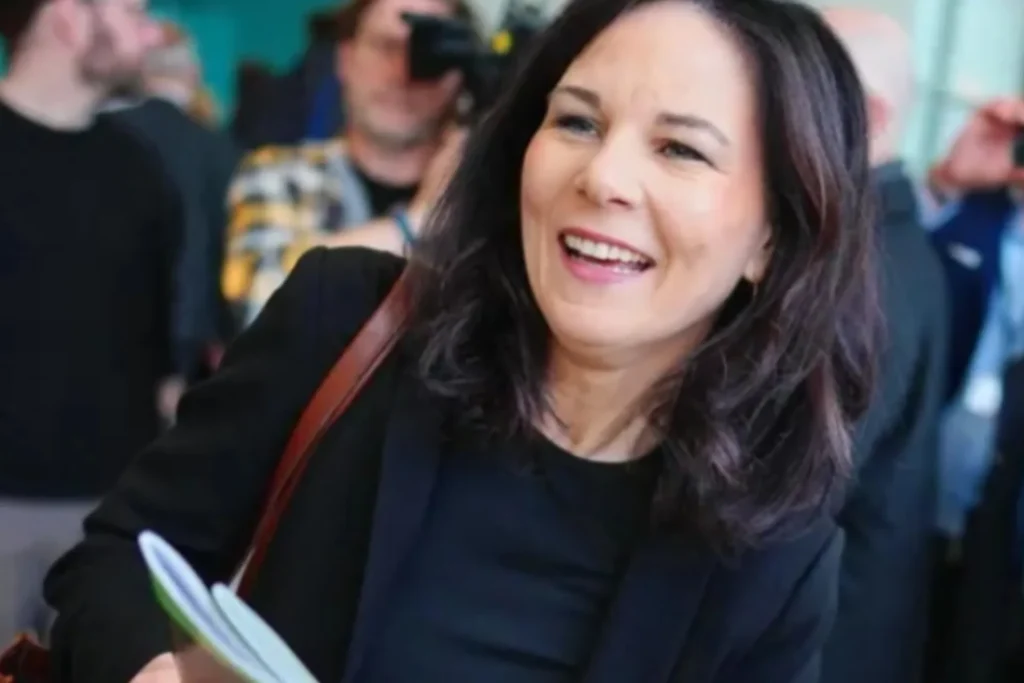Table of Contents
In a political landscape characterized by rapid change and uncertainty, Annalena Baerbock has emerged as a formidable figure within Germany’s political sphere and beyond. As the co-leader of the German Green Party since 2018 and the country’s first female Foreign Minister since taking office in December 2021, Baerbock has positioned herself as a champion of progressive policies, particularly in environmental sustainability and human rights. Her ascendance to prominence in German politics reflects broader transformations within the European Union and the global approach to climate change, geopolitical tensions, and social justice.
Early Life and Political Ascent
Born on December 15, 1980, in the small town of Templin, located in the state of Brandenburg, Baerbock was raised in a politically aware household. She pursued her higher education at the University of Hamburg, earning a degree in Political Science and International Law, which laid the groundwork for her future in public service. Before entering politics, Baerbock worked as a consultant in the policy sector, focusing on climate and renewable energy issues, which directly influenced her political ideologies and objectives.

Baerbock’s journey in politics began in 2005 when she joined the Green Party. Her commitment to environmental issues quickly became apparent, and in 2013, she became a member of the Bundestag, Germany’s federal parliament. Her parliamentary work primarily focused on issues pertaining to families, youth, and international development. Baerbock’s dynamic speaking style and ability to connect with a wide array of audiences made her a rising star within the party, eventually leading to her co-leadership alongside Robert Habeck.
The Green Agenda
Annalena Baerbock’s political platform emphasizes the urgency of addressing climate change. With a plethora of scientific evidence highlighting the dire consequences of global warming, she champions a Green New Deal, advocating for substantial investments in renewable energy and sustainable infrastructure. Her policy proposals encompass ambitious targets for reducing carbon emissions, promoting biodiversity, and transitioning Germany’s economy away from fossil fuels.
Under her leadership, the Green Party has experienced significant electoral success, particularly in the 2021 federal elections, where they secured their highest vote share to date. Baerbock’s appeal extends beyond environmentalists; many voters are drawn to her vision of a more inclusive society that prioritizes social justice and equality. Her ability to articulate the intertwined nature of climate action and social equity resonates particularly with younger voters, a demographic that has increasingly engaged in political activism.
Foreign Policy: Navigating Challenges
As Germany’s Foreign Minister, Baerbock finds herself at the helm during a tumultuous time in global politics. The ongoing war in Ukraine, rising authoritarianism in various nations, and growing concerns about China’s assertiveness in international affairs complicate her role. Baerbock has taken a clear stance on these issues, advocating for a robust response to Russian aggression while promoting international solidarity with Ukraine. Her commitment to human rights extends into her foreign policy approach, as she emphasizes the need to support democratic movements and uphold human rights standards globally.
Baerbock’s rhetoric often highlights the concept of “values-based foreign policy,” asserting that Germany must lead by example in promoting democracy, freedom, and the rule of law. This approach contrasts with traditional diplomacy, which frequently prioritizes economic interests over ethical considerations. By adopting this framework, Baerbock aims to redefine Germany’s position in the world, steering it toward a more principled and sustainable foreign policy stance.
Challenges and Criticisms
Despite her rapid rise and popularity, Baerbock has faced significant challenges. Her ascent has not been without scrutiny; detractors highlight her inexperience in high-pressure international negotiations compared to established political figures. Critics have, at times, dismissed her as overly idealistic, arguing that she may struggle to balance ambitious goals with pragmatic realities in international diplomacy.
Furthermore, Baerbock has also faced backlash within Germany regarding the economic implications of her green policies. The transition to a greener economy, while necessary, raises concerns about job losses in traditional sectors. Striking a balance between environmental sustainability and economic stability is a task that Baerbock must navigate delicately, ensuring that no demographic feels left behind in the transition process.
A Global Influence
Baerbock’s approach to foreign policy and climate action resonates far beyond Germany. As a prominent figure in Europe, she is recognized for her active role in European Union discussions on climate policy and international relations. Her focus on collective action and multilateralism reflects a growing trend among political leaders advocating for solutions to global challenges that transcend national borders.
Baerbock is also gaining recognition on the international stage as an advocate for women’s rights and gender equality, striving to ensure that these issues are addressed in broader discussions about development and security. Her commitment to gender equality is not only evident in her speeches but is also a guiding principle in her domestic and foreign policy decisions.
Looking Forward
Annalena Baerbock’s trajectory in German and global politics offers a glimpse into a future where environmental sustainability and social justice become intertwined with national and international policy-making. As she continues to navigate the complexities of her role as Foreign Minister, Baerbock’s influence is poised to grow, shaping Germany’s global image and reinforcing its commitment to a sustainable future.
Her leadership style—characterized by transparency, empathy, and a strong moral compass—may inspire a new generation of policymakers, particularly women, to engage in politics. The evolving political landscape, marked by climate catastrophes and humanitarian crises, demands leaders like Baerbock, who prioritize ethical considerations alongside pragmatic governance.
While challenges remain, her proactive stance on climate change and commitment to human rights signal a shift toward a more progressive, values-driven approach in global politics. As the world faces unprecedented challenges, Baerbock stands at the forefront, embodying a new vision for a resilient and equitable future. Whether she will be able to strike the delicate balance between ambitious ideals and practical governance remains to be seen, but her trajectory suggests that she will be a key player on the world stage for years to come.
